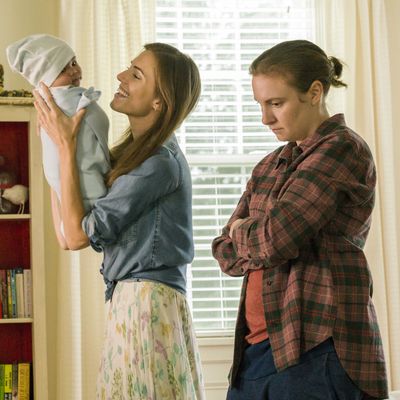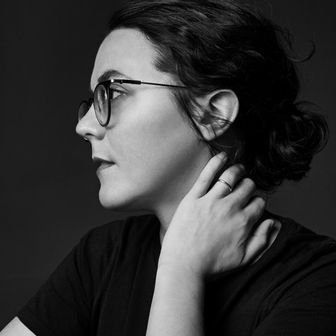
Perhaps in an ode to their sleeping habits during the show’s earliest episodes, the Girls finale last night opened with Marnie spooning a sleeping Hannah. It’s a quick way to show us how much has changed: “When did you get here?” pregnant Hannah demands, just before Marnie successfully convinces her that she, Marnie, should move in and help raise the baby.
Predictably, Marnie’s help is very Marnie: We see her waiting and ready when Hannah exits a checkup with Grover, a baby we’ve just learned weighs 13 pounds. As I watched, I tried to do some frantic comparison math — when did Dudley weigh 13 pounds? My son is a year old now, and I could track down the answer if I tried, but the truth is, off the top of my head, I have no idea. My guess is Hannah will forget the minutia of Grover’s early life in much the same way. But someone else — someone present, but less wrecked in body and soul by childbirth and early motherhood — might remember. Someone like Aunt Marnie.
For new moms, a Marnie can come in different forms and with different labels: a romantic partner, a family member, a good friend. This person is invested in the well-being of the mother and baby alike, and does things like parallel Googling “green poop,” changing the baby in the middle of night, walking to the store to buy three different kinds of bottles when the baby hates the first — in general, this person helps maintain a facade of competence in the face of early parenthood. Not all moms are lucky enough to find a Marnie, but the ones who do have a partner and steward through babyhood challenges, a companion whose diligent, careful, non-postpartum sense of composure will eventually prove infuriating. In Hannah’s case, Marnie is a friend who lives with her and calls herself the baby’s aunt.
Aunt Marnie wants to know if breastfeeding came up during the appointment (Grover’s on a nursing strike) and disdains the babies in the waiting room, who look “formula fed”; still on the subject, she calls breast milk “liquid gold” on the drive home. She mentions immunity, a study about the cognitive benefits (some might counterpoint with this study from last month), and implores Hannah, who describes her nipples as “iguana skin” and isn’t sure about pumping at work, to keep trying for Grover’s sake. Marnie’s breastfeeding information and insistence is annoying, pushy, hurtful, even. But the ability to breastfeed is also — as we learn from concerned comments about bonding to the pediatrician — what Hannah wanted, at least at some point.
Just as Marnie’s pushiness is easy to believe, Hannah’s surly, ungrateful reaction is what you’d expect from the character. When Marnie floats the idea of going by herself to a wine bar, Hannah’s having none of it: “So I would just like stay here all night with Grover by myself?” While not unexpected from the woman we’ve come to know over six seasons, this reaction is Hannah at her most realistic and relatable, when you consider her as a new mom.
I don’t remember how much my baby weighed when he was Grover’s age, but I do remember this: One evening while I was on maternity leave, my husband (for the purposes of this argument, my Marnie) casually mentioned his gums were a little sore from a teeth cleaning. You went to the dentist, I hissed, without telling me? It was one thing for him to go to work all day, another to be lying back in a dentist’s chair, secure in knowing someone else had the baby. Hannah bargains in a way I might have, had my husband mentioned enjoying himself for just one night — does Marnie want to eat cheese at home? No, Marnie does not. The same evening, Hannah barges in on Marnie taking lingerie selfies and declares the baby hates her, that Marnie should swaddle and bottle-feed him. “Okay,” Marnie says.
Something I hear a lot from other mothers with babies and toddlers is the desire for permission — whether that means permission to cry it out, to keep feeding the baby multiple times a night, to continue breastfeeding or to quit, to call or not call the pediatrician. The hardest part about parenthood, at least to me, is wanting permission and then not quite trusting it, once it’s given. What’s trustworthy in a world colored by rocky hormones and no sleep? Nothing and no one, not even your Marnie.
If you’re fortunate enough to have one, your Marnie is usually tasked with outperforming you as a parent, at least in the beginning. It’s easier to successfully swaddle a tiny body if your own wasn’t recently split in half by childbirth, and if you have a Marnie, she’ll make it look easy. Of course you hate that person. Of course you need that person, preferably at most hours of the day and night. That person is going to read you a guide to latching that will make you feel insane (“Are you making an envelope with your nipple?” Hannah snaps). And when it’s still not working, that person is going to make the call to give the baby something other than breast milk (“These ingredients aren’t even that bad,” Marnie says, scanning the back of a can of formula).
During early parenthood, your Marnie is probably more able-bodied than you, with more sleep and brain space available to read a study or weigh all the options. But no one’s giving her permission either; she’s just able to fake the authority a little better, on more sleep and with fewer hormones. Until you realize that permission and authority and correctness have terrifyingly little to do with taking care of a baby, Marnie’s your temporary punching bag and your next-best thing. But just like Hannah, you’ll have a hard time appreciating her or her assistance at the time, for all the reasons you need her in the first place.





